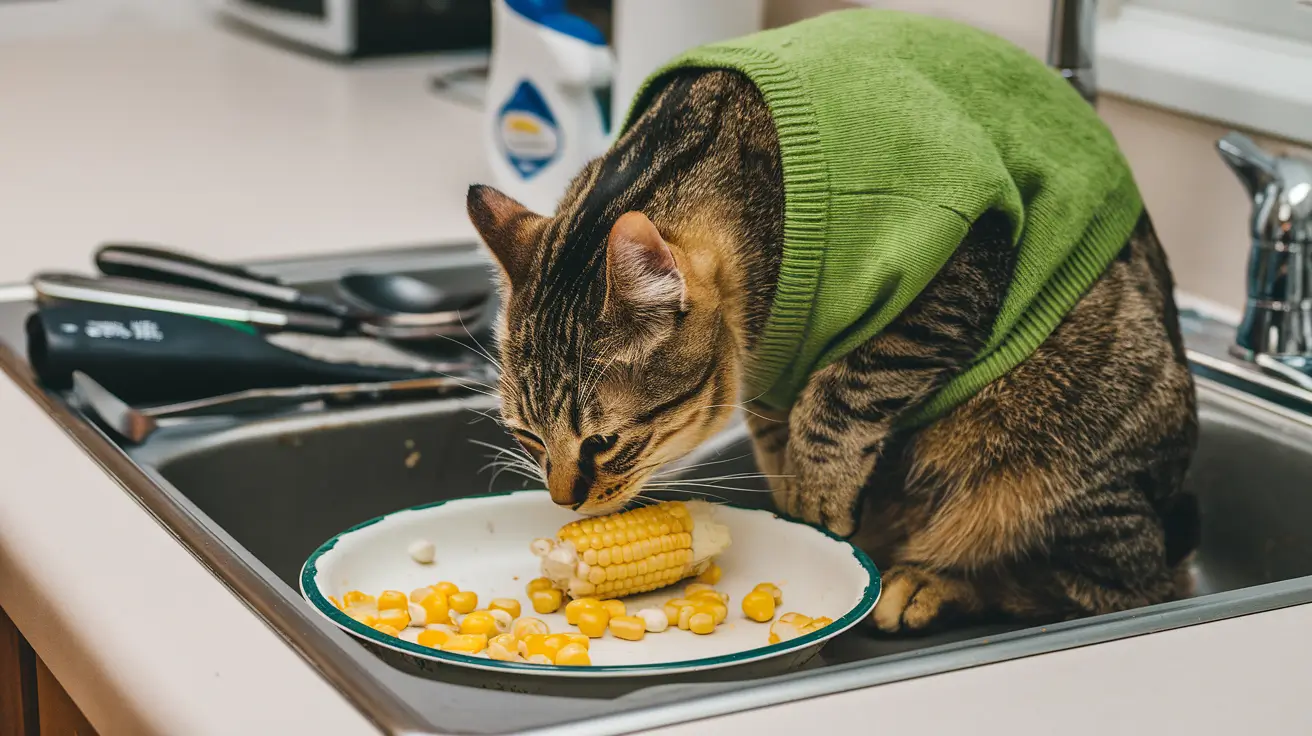As a cat owner, you might have caught your feline friend eyeing your plate of corn or even trying to nibble on a corn tortilla. With Halloween around the corner, you may also wonder if candy corn is safe for your cat. This comprehensive guide explores whether cats can safely consume various forms of corn, including corn on the cob, husks, cornbread, corn starch, corn flakes, corn tortillas, corn leaves, and even candy corn.
Can Cats Eat Corn?
Yes, but with caution.
Corn itself is not toxic to cats, and they can eat it without immediate harm. Cats are obligate carnivores, meaning their diet must consist primarily of animal protein to meet their nutritional needs. Their digestive systems are optimized for processing proteins and fats, not carbohydrates. Corn is high in carbohydrates and contains fiber, vitamins, and minerals, but these nutrients are not essential for cats.
Cats have limited amounts of the enzyme amylase in their saliva and pancreas, which means they are less efficient at breaking down carbohydrates like those found in corn. While a small amount of corn can pass through their digestive system without causing harm, it doesn’t provide beneficial nutrients and can fill them up, potentially leading to decreased consumption of their nutritionally balanced cat food.
Key Points:
- Safe in small amounts: A little bit of corn won’t harm your cat.
- Not nutritionally beneficial: Corn doesn’t offer the essential nutrients cats require.
- Potential allergens: Some cats may be allergic to corn.
Can Cats Eat Corn on the Cob?
They can eat the kernels, but with caution.
Cats can consume corn kernels in small quantities, but feeding them corn on the cob poses significant risks. The cob is a tough, fibrous material that cats cannot digest. If ingested, pieces of the cob can cause an intestinal blockage, a serious condition that may require surgical intervention. Symptoms of blockage include vomiting, loss of appetite, and abdominal pain.
Additionally, the cob’s rough texture can damage the delicate lining of a cat’s gastrointestinal tract. If you choose to offer your cat corn, ensure that the kernels are removed from the cob and are plain, cooked, and unseasoned to avoid introducing harmful substances like salt or butter.
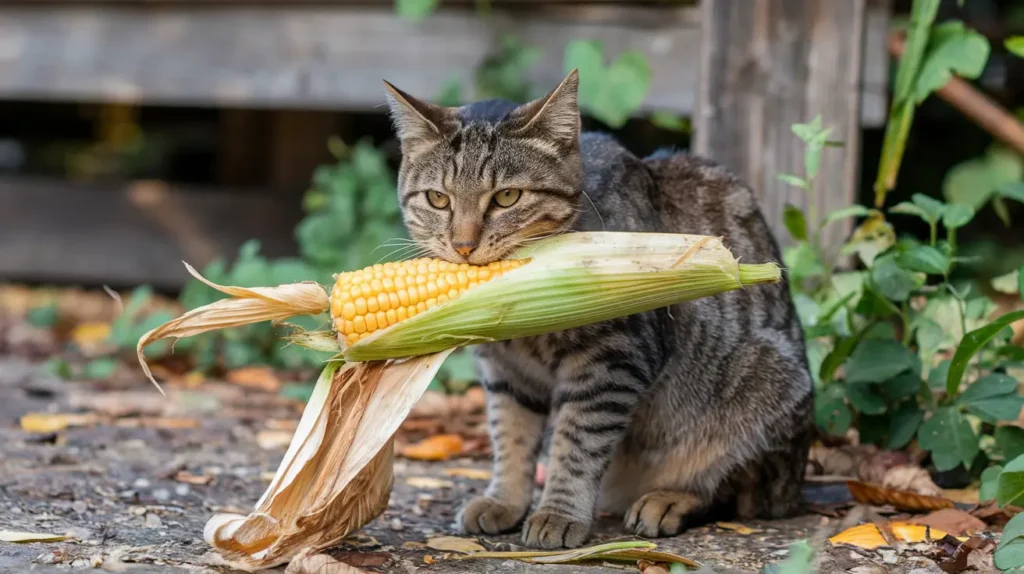
Can Cats Eat Corn Husks?
No, they should not eat corn husks.
Corn husks are the leafy outer layers of the corn cob and are composed mainly of cellulose and lignin—fibrous materials that cats cannot digest. Ingesting corn husks can lead to gastrointestinal irritation or obstruction. The fibrous strands can clump together in the stomach or intestines, causing a blockage that prevents food from passing through.
Symptoms of gastrointestinal blockage include vomiting, constipation, lethargy, and abdominal swelling. Since cats lack the necessary enzymes to break down plant fibers effectively, it’s best to keep corn husks away from them to prevent accidental ingestion and potential health complications.
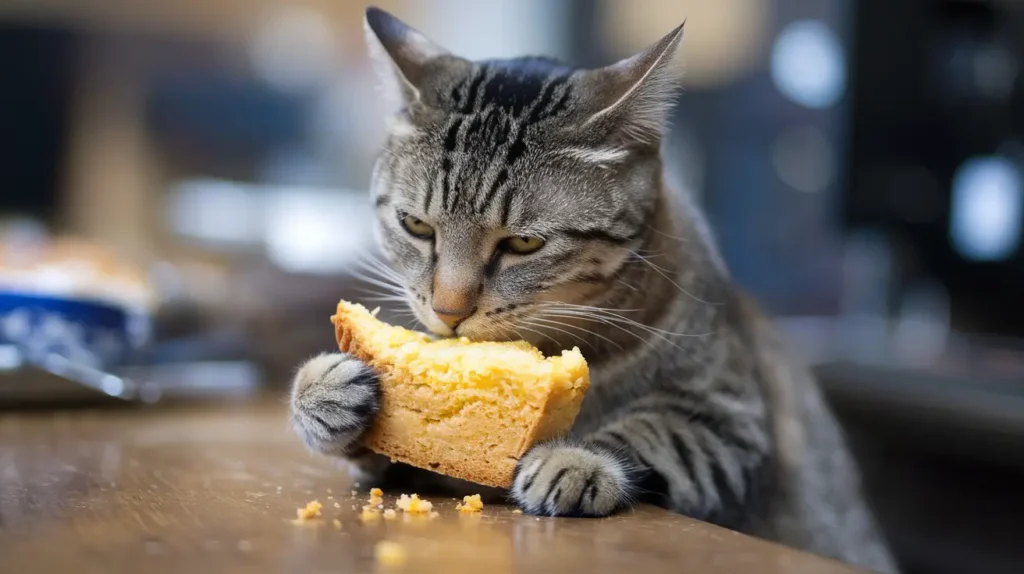
Can Cats Eat Cornbread?
They can eat small amounts, but it’s not recommended.
Cornbread is made from cornmeal, which is ground dried corn. While cornmeal isn’t toxic to cats, cornbread often contains additional ingredients like sugar, salt, milk, eggs, and butter. Cats are lactose intolerant to varying degrees because they lack sufficient amounts of the enzyme lactase needed to digest lactose in dairy products. Consuming dairy can lead to diarrhea and gastrointestinal discomfort.
Moreover, the high carbohydrate content in cornbread isn’t ideal for cats. Excess carbohydrates can contribute to obesity and may affect blood glucose levels, potentially leading to diabetes mellitus over time. Some cornbread recipes also include ingredients like onions or garlic, which contain thiosulfates that can cause oxidative damage to red blood cells, leading to hemolytic anemia in cats.
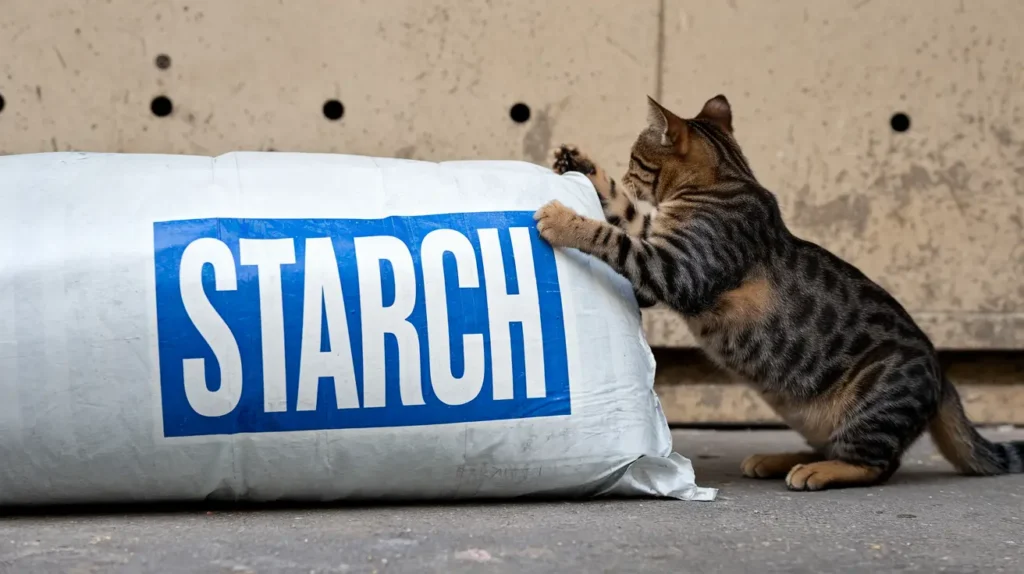
Can Cats Eat Corn Starch?
Small amounts are generally safe, but it’s unnecessary.
Cornstarch is a fine, powdery carbohydrate extracted from the endosperm of corn kernels. While it’s not toxic, cornstarch offers no nutritional benefits to cats. Cats have limited ability to digest and utilize carbohydrates due to low levels of amylase enzymes. Consuming large amounts of cornstarch can lead to digestive issues like bloating, gas, or diarrhea because the undigested starch ferments in the colon.
Additionally, a diet high in carbohydrates can contribute to obesity and affect insulin sensitivity, increasing the risk of diabetes. Since cornstarch doesn’t provide essential nutrients like taurine, arachidonic acid, or vitamin A—which cats need from animal sources—it’s best to avoid giving it to them.
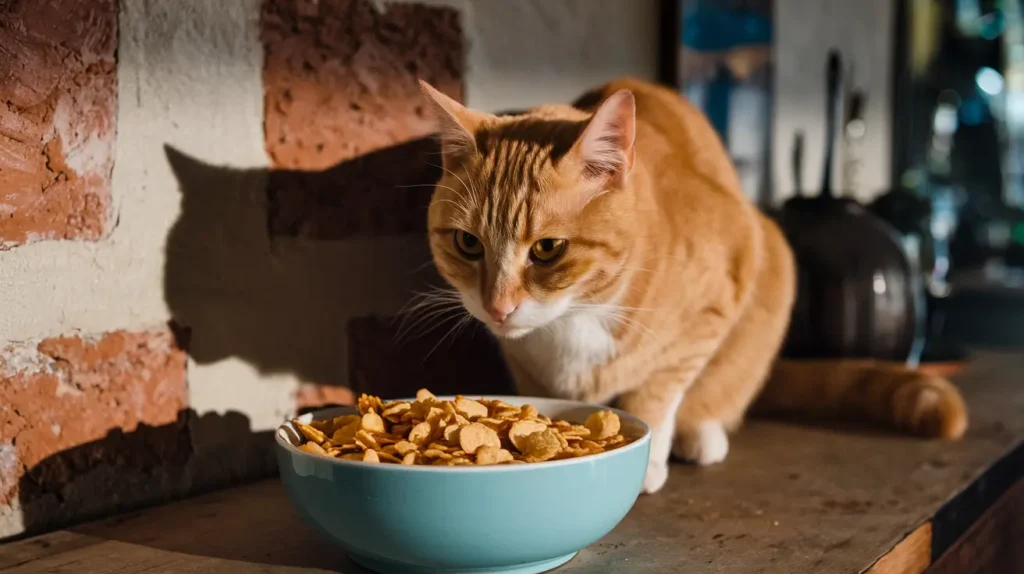
Can Cats Eat Corn Flakes?
Not recommended, but a small amount may not cause harm.
Corn flakes are breakfast cereals made from milled corn and often contain added sugars, salts, and sometimes artificial flavors or preservatives. Cats do not have a dietary requirement for sugars, and excessive sugar intake can lead to obesity, dental issues, and potential insulin resistance. High sodium levels from added salt can disrupt electrolyte balance, leading to dehydration or kidney strain.
Moreover, cats lack the taste receptors for sweetness, so they don’t derive any sensory pleasure from sugary foods. The additives and preservatives in corn flakes may cause allergic reactions or gastrointestinal upset. Given the lack of nutritional benefits and potential risks, it’s advisable to keep corn flakes out of your cat’s diet.
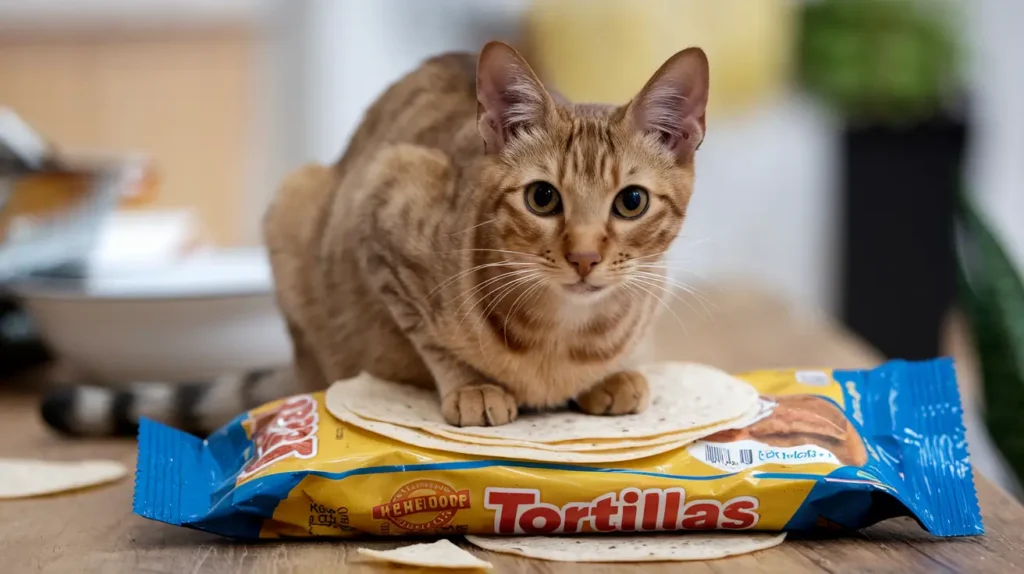
Can Cats Eat Corn Tortillas?
They can eat small pieces occasionally, but it’s unnecessary.
Corn tortillas are made from cornmeal or masa harina and water, forming a simple, unleavened bread. While the basic ingredients are not toxic, corn tortillas are high in carbohydrates and low in protein and fats, which are essential nutrients for cats. Excessive carbohydrate intake can lead to weight gain and may negatively impact blood sugar regulation.
Furthermore, some store-bought tortillas may contain preservatives or additives like propionic acid or phosphates, which could be harmful in large quantities. If you choose to give your cat a small piece of plain, unseasoned corn tortilla, it should be a rare treat and not a regular part of their diet.
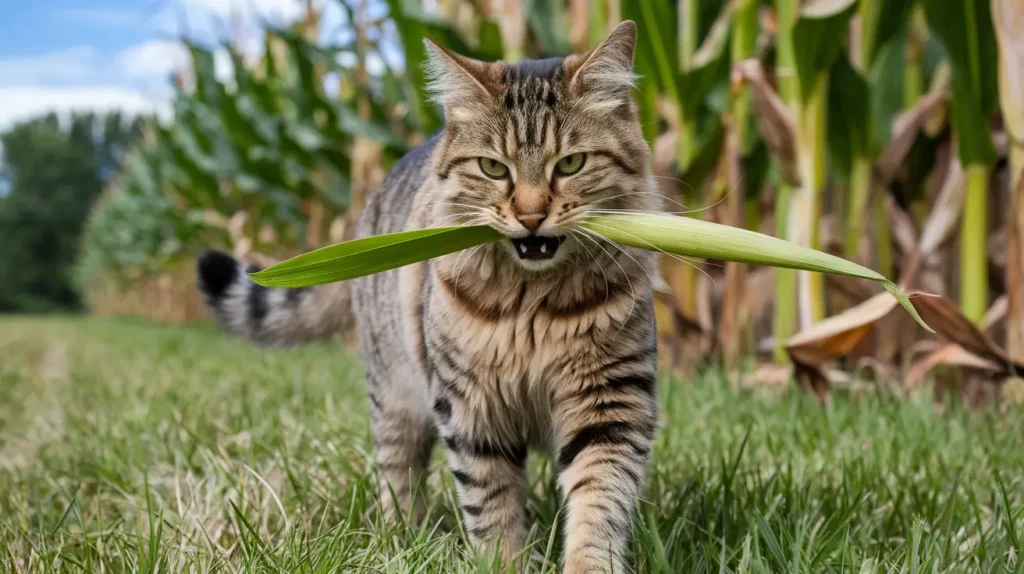
Can Cats Eat Corn Leaves?
No, they should not eat corn leaves.
Corn leaves are composed of fibrous plant material rich in cellulose, which cats cannot digest due to the lack of necessary enzymes like cellulase. Ingesting corn leaves can cause mechanical irritation to the gastrointestinal tract, leading to symptoms such as vomiting, diarrhea, or abdominal discomfort.
There’s also a risk of intestinal blockage if the leaves accumulate in the digestive tract. Additionally, corn plants may have been treated with pesticides or fertilizers, introducing the risk of chemical poisoning if ingested. To ensure your cat’s safety, keep them away from corn plants and their leaves.
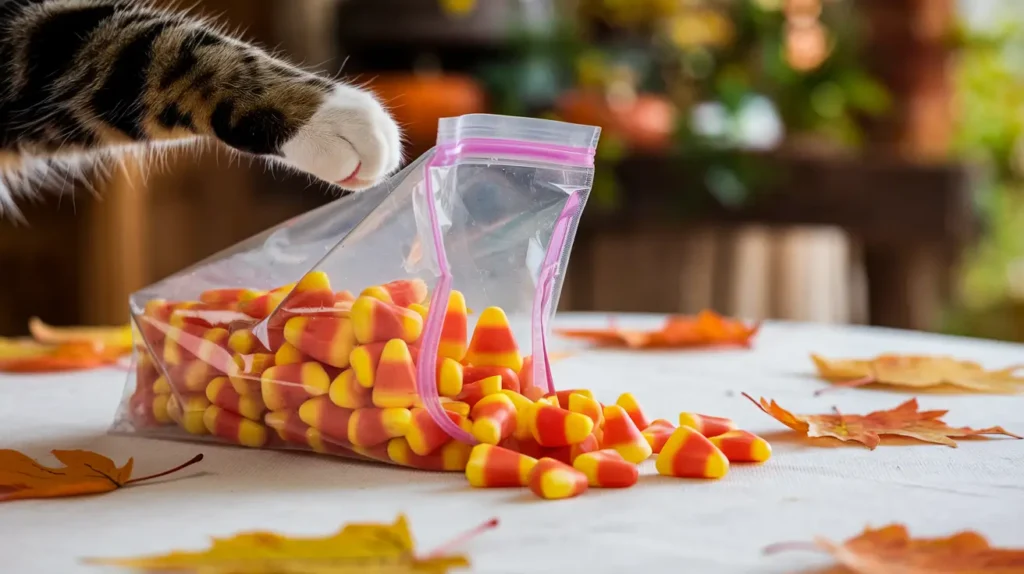
Can Cats Eat Candy Corn?
No, they should not eat candy corn.
Candy corn is a confection made primarily of sugar, corn syrup, artificial colors, and flavors. Cats lack the ability to taste sweetness due to the absence of the Tas1r2 gene, so they don’t benefit from sugary treats. Consuming candy corn can lead to several health issues:
- High Sugar Content: Excessive sugar can cause rapid spikes in blood glucose levels, potentially leading to hyperglycemia and, over time, insulin resistance or diabetes.
- Gastrointestinal Upset: Artificial additives and high sugar content can cause vomiting, diarrhea, or abdominal pain.
- Toxic Ingredients: Some candies contain xylitol, a sugar substitute highly toxic to cats, leading to hypoglycemia and liver failure.
- Choking Hazard: The size and shape of candy corn can pose a choking risk.
With Halloween approaching, it’s essential to keep all candies out of your cat’s reach to prevent accidental ingestion and potential poisoning.
Conclusion
While corn and its derivatives are not inherently toxic to cats, they offer minimal nutritional benefits and can pose various health risks depending on the form and quantity consumed. Cats are obligate carnivores with dietary needs centered around animal-based proteins and fats. Their digestive systems are not equipped to handle large amounts of carbohydrates or plant fibers.
Feeding your cat corn products can lead to gastrointestinal issues, nutritional imbalances, and long-term health problems like obesity and diabetes. If your cat shows interest in corn, a small amount of plain, cooked corn kernel is unlikely to cause harm but isn’t necessary for their diet.
Always prioritize high-quality, species-appropriate nutrition for your cat. Consult with a veterinarian before introducing new foods, especially human foods, into your cat’s diet. This Halloween, ensure that treats like candy corn are securely stored away to keep your feline friend safe and healthy.

